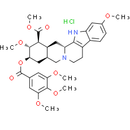Description
Reserpine HCl is a naturally occuring brain-penetrant and irreversible VMAT vesicular monoamine transporter 1 and 2 antagonist
Product information
CAS Number: 16994-56-2
Molecular Weight: 645.14
Formula: C33H41ClN2O9
Chemical Name: methyl (1R,15S,17R,18R,19S,20S)-6,18-dimethoxy-17-(3,4,5-trimethoxybenzoyloxy)-3,13-diazapentacyclo[11.8.0.0,.0,.0,]henicosa-2(10),4,6,8-tetraene-19-carboxylate hydrochloride
Smiles: Cl.COC1C=C(C=C(OC)C=1OC)C(=O)O[C@@H]1C[C@@H]2CN3CCC4C5=CC=C(C=C5NC=4[C@H]3C[C@@H]2[C@@H]([C@H]1OC)C(=O)OC)OC
InChiKey: ZYWIWGUMKCZKOO-BQTSRIDJSA-N
InChi: InChI=1S/C33H40N2O9.ClH/c1-38-19-7-8-20-21-9-10-35-16-18-13-27(44-32(36)17-11-25(39-2)30(41-4)26(12-17)40-3)31(42-5)28(33(37)43-6)22(18)15-24(35)29(21)34-23(20)14-19;/h7-8,11-12,14,18,22,24,27-28,31,34H,9-10,13,15-16H2,1-6H3;1H/t18-,22+,24-,27-,28+,31+;/m1./s1
Technical Data
Appearance: Solid Power
Purity: ≥98% (or refer to the Certificate of Analysis)
Solubility: DMSO : ≥ 100 mg/mL (155.01 mM) H2O : < 0.1 mg/mL (insoluble)
Shipping Condition: Shipped under ambient temperature as non-hazardous chemical or refer to Certificate of Analysis
Storage Condition: Dry, dark and -20 oC for 1 year or refer to the Certificate of Analysis.
Shelf Life: ≥12 months if stored properly.
Stock Solution Storage: 0 - 4 oC for 1 month or refer to the Certificate of Analysis.
Drug Formulation: To be determined
HS Tariff Code: 382200
How to use
In Vitro:
Reserpine hydrochloride is an inhibitor of the vesicular monoamine transporter 2 (VMAT2). Reserpine hydrochloride displays a significant on the density of dopamine D1 receptors (F2, 12=8.81, p<0.01) in the rat striatum. The affinity (Kd) for the dopamine D1 and D2 receptors during withdrawal from acute and chronic administration of reserpine is not change[1]. IC50 values of 43.9 and 54.9 μM are obtained after 1 day of treatment with Reserpine hydrochloride in JB6 P+ and HepG2-C8 cells, respectively. Reserpine hydrochloride induces luciferase activity in a dose-dependent manner at concentrations ranging from 5 to 50 μM, and no significant induction is observed at concentrations lower than 5 μM. Results demonstrate that Reserpine hydrochloride (2.5 to 10 μM) also increases the protein expression of Nrf2, HO-1, and NQO1. Reserpine hydrochloride at concentrations of 2.5 to 10 μM decreases the mRNA expression of DNMT1, DNMT3a, and DNMT3b in a concentration-dependent manner in JB6 P+ cells after 7 days of treatment. Reserpine hydrochloride at 10 μM generates a significant difference for DNMT3a expression (p<0.05)[2].
In Vivo:
Withdrawal (48 h) from chronic (14-day) but not acute Reserpine hydrochloride administration in a dose of 0.2 mg/kg i.p. produces a significant reduction of the immobility time (F2, 18=3.68, p<0.05), but increases the climbing time (F2, 18=4.48, p<0.02), and does not change the swimming time (F2, 18=1.78; NS) in the forced swim test (FST) in rats[1]. Reserpine hydrochloride at a dose of 5 mg/kg body weight produces significant increase in the urinary excretion profile of vanillylmandelic acid (VMA) compare to control animals. The amount of 5-hydroxyindoleacetic acid (5-HIAA) excreted in animals treated with Reserpine is found to be more than in the control. Dose dependent hypotension is observed with Reserpine hydrochloride. Reserpine hydrochloride at doses of 0.5, 1, 5, 10 and 15 μg/kg produce significant (p<0.01) reduction in blood pressure compare to control[3].
References:
- Antkiewicz-Michaluk L, et al. Withdrawal from repeated administration of a low dose of reserpine induced opposing adaptive changes in the noradrenaline and serotonin system function: a behavioral and neurochemical ex vivo and in vivo studies in the rat. Prog Neuropsychopharmacol Biol Psychiatry. 2015 Mar 3;57:146-54.
- Hong B, et al. Reserpine Inhibit the JB6 P+ Cell Transformation Through Epigenetic Reactivation of Nrf2-Mediated Anti-oxidative Stress Pathway. AAPS J. 2016 May;18(3):659-69.
- Sreemantula S, et al. Reserpine methonitrate, a novel quaternary analogue of reserpine augments urinary excretion of VMA and 5-HIAA without affecting HVA in rats. BMC Pharmacol. 2004 Nov 16;4:30.
Products are for research use only. Not for human use.
Payment & Security
Your payment information is processed securely. We do not store credit card details nor have access to your credit card information.


